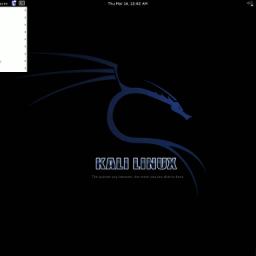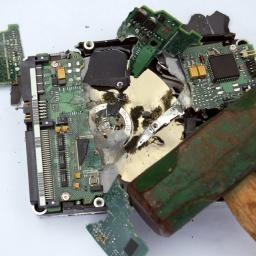 In the Hindu pantheon
In the Hindu pantheon, Kali represents death and change, the dispelling of evil and the devouring of the unwanted. She is forbidden, and even death itself, but therefore also an element of salvation. In the Linux world, she is like opening a can of whoop-ass on your server.
Kali Linux (appropriately named, if I may say so) is a Linux distro focused on penetration and exploit testing, and therefore the element of change that will get you to shore up all those gaping configuration gaps in your systems: it's perhaps your salvation! But enough metaphors. Practically, Kali Linux installs on a DVD or pendrive, and contains dozens and dozens of specialized penetration testing tools to test your system. It's developed by the folks at
Offensive Security, and grew out of the well-acclaimed
Backtrack Linux, which had the same focus.
It's based on Debian rather than Ubuntu so you get a dated version of the Gnome 2 desktop, but who cares? It's not really a desktop, just a platform for launching tools. Over three hundred of them, from information gathering to vulnerability analysis, password attacks, wireless attacks, spoofing, stress testing, reverse engineering, hardware hacking, forensics, and more. As mentioned, you can run it from a DVD, pendrive, or even remote-boot from PXE or install to Amazon cloud. To make it as useful as possible they support ARM aggressively including ARMEL and ARMHF (and of course Raspberry Pi and cousins), plus as many different wifi devices as humanly possible.
They're innovating, too, producing opensource products like the
ISO of Doom (hardware backdoor), custom images, the
Evil Wireless Access Point, and more.
Fun stuff if you want to ensure your system is as safe as possible; scary stuff if you don't want to bother. Kali's
Distrowatch page has more information including a link to their excellent documentation (the best place to start if you want to know what else Kali does), but
ZDNet has a good review and
LinuxBSDOS has another cursory review with some decent screenshots.
 SIMS 4 has been out long enough for reviewers and gamers to provide feedback on the latest chapter in the mighty SIMS franchise. So far the reviews have not been highly positive.
SIMS 4 has been out long enough for reviewers and gamers to provide feedback on the latest chapter in the mighty SIMS franchise. So far the reviews have not been highly positive. 
